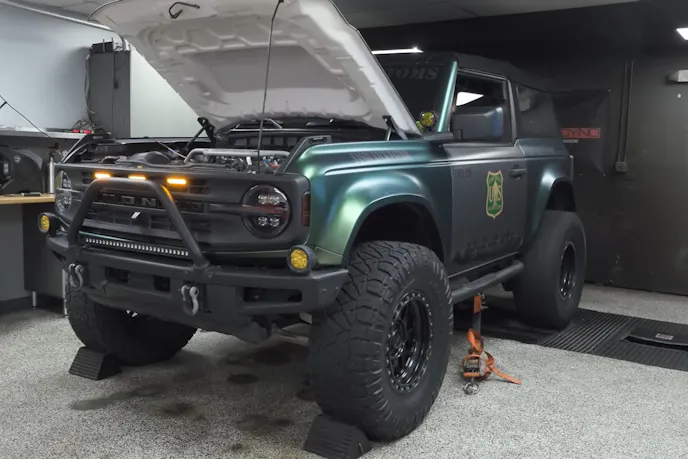Now that custom tuning is finally available for the modern Ford Bronco platform, owners are eager to find out how much power is really hiding in their EcoBoost engines. Palm Beach Dyno tuned around and found out, putting two stock vehicles on its in-house chassis dyno for a definitive Bronco vs. Bronco Raptor showdown to see what a professional tune is truly worth.
The test began with a stock 2.7-liter Bronco, which established a baseline of 256 wheel horsepower. After a methodical tuning process using HP Tuners software and hardware, tuner Ken Bjonnes landed on a final number of 320 wheel horsepower after multiple revisions. That’s a gain of 64 rear-wheel horsepower. He noted that the most improvement was in the midrange.
“We have a huge gain here in the middle of over 25 horsepower, which you’re probably going to be spending more time here than you are up here,” Ken explained. He stressed the importance of this process, stating, “Dyno on new applications is very important.”
Next, the completely stock Bronco Raptor was strapped down, making a stronger baseline of 327 wheel horsepower. After applying their tuning expertise, Ken brought the 93-octane number up to an impressive 421 rear-wheel horsepower. But the true gains came with an E30 ethanol blend.
With E30 in the tank, the final numbers were a staggering 459 wheel horsepower and 503 lb-ft of torque. “This truck is completely stock besides my tune in E30, and I am ecstatic,” Ken said after the final pull. This final Bronco vs. Bronco Raptor comparison showed the massive potential of the Raptor’s 3.0-liter EcoBoost engine. The stock vs. tuned showdown revealed just how much performance Ford left on the table. A custom tune from a shop like Palm Beach Dyno completely transforms the driving experience for both the 2.7-liter Bronco and the 3.0-liter Bronco Raptor. The peak gains are impressive, but the real story is the huge increase in usable power across the entire rev range. Ken noted that with the E30 tune, the Bronco Raptor’s midrange gains were massive.
The stock vs. tuned showdown revealed just how much performance Ford left on the table. A custom tune from a shop like Palm Beach Dyno completely transforms the driving experience for both the 2.7-liter Bronco and the 3.0-liter Bronco Raptor. The peak gains are impressive, but the real story is the huge increase in usable power across the entire rev range. Ken noted that with the E30 tune, the Bronco Raptor’s midrange gains were massive.
You might also like
Pro Burnout Cars Bring The Smoke To Mustang Week Texas 2026
Smoke Show: Fords vs The World ignites Mustang Week Texas. Two nights of burnout chaos with $15,000 on the line!






